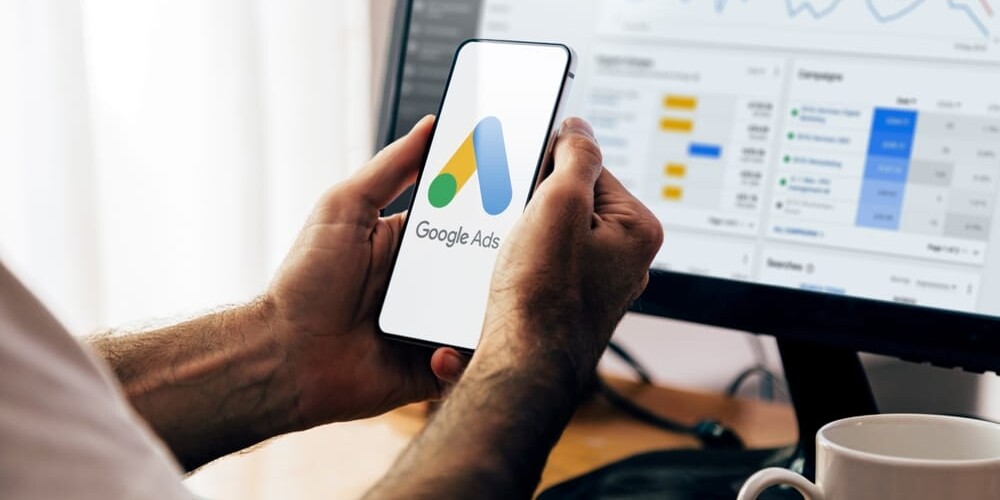A Beginner’s Guide to Google Ads
Have you previously invested in SEO and are just waiting around for the organic traffic to flow in? Maybe you are a new business owner and need to attract clientele quickly. Or perhaps you always see the websites that show up on the top of the SERPs with the little words “sponsored” above them? And wondered what that was and how it got there. The answer is Google Ads. This type of pay-per-click (PPC) advertising places your business directly in front of your target audience, delivering immediate visibility.
Integrity Marketing is a seasoned Google Ads agency specializing in optimizing and managing ad campaigns for small to medium-sized businesses. Read on to discover how we can help you achieve your advertising goals.

What Are Google Ads?
Google Ads is a paid advertising stream that falls under the marketing channel pay-per-click (PPC), where you (the advertiser) pay per click or per impression (CPM) on an ad.
Simply put, Google Ads allows you to advertise and promote your products and services and rank above organic search. The most common type of Google Ads you may already be familiar with are “Search Ads.” They come up on top of search results before the organic ones. You can spot them because they are labeled “Ad” or “Sponsored.”
If you’re wondering why Google Ads are so popular, it’s because they are highly targeted. You can set parameters like location, language, and even the type of device on which your ads will pop up on. This ensures that your ads reach the right audience at the right time.

How Do Google Ads Work?
Before we jump into the types of Google Ads, let’s understand how the platform works. When creating an ad, you choose a set of keywords you want to target. When someone types in those keywords on Google, your ad then shows up in the search results. But it’s not that simple. In reality, it is more like you create an ad, set your parameters, bid on Google, and see if you win the bid.
The Auction System
Google Ads operates on an auction system. Every time a search is initiated, Google evaluates its pool of advertisers and selects a few to occupy the prime ad space on search results pages. The selection is based on factors such as keyword relevance, ad campaign quality, and bid size.
Bid Amount: Advertisers set a maximum bid for how much they are willing to pay per click on their ad. While a higher bid can improve the chances of winning an ad spot, it’s not the only factor considered.
Ad Relevance: Google also looks at how well the ad aligns with the user’s search query. Ads that closely match the search intent are more likely to be favored.
Ad Extensions and Format: The use of ad extensions, such as additional links or contact information, and the overall format of the ad can impact its performance and visibility.
Example:
Let’s say you are running ads for your landscaping company called Green Thumb.
A user searches for “landscaping services near me” on Google. Google scans its pool of advertisers who have bid on similar keywords. It evaluates your ad based on its bid amount, Quality Score, and ad relevance. Google then selects a set of winning ads to display in the search results. Green Thumb’s ad might appear if their Quality Score and bid amount meet the criteria for a top spot.

Quality Score
Another crucial component is the Quality Score. This score is determined by the relevance of your ad text, keywords, and your landing page experience. A higher Quality Score can lead to lower costs and better ad positions. Google aims to provide users with the most relevant ads, so ensuring your ads are high-quality and pertinent to the searcher’s query is crucial.
Organic Vs. Paid Search Results
It’s also essential to differentiate between organic and paid search results. Organic results are earned through SEO practices (keyword targeting, on and off page optimization, backlinks, ect) while paid results are secured through Google Ads. You’ll notice the top search results above the map pack are labeled “sponsored” signaling they are Google Ads. The top organic Search results are below the map pack and are not labeled sponsored.

One of the most significant differences between Google Ads and SEO is the speed at which results are achieved.
Google Ads offer almost instantaneous results. Once you set up a campaign, select your keywords, and launch your ads, they can begin appearing in search results within a matter of hours or even minutes. This immediate visibility allows you to quickly reach potential customers and start driving traffic to your site.
On the other hand, SEO (Search Engine Optimization) is a long-term strategy that requires patience and persistence.
When you implement SEO practices—such as optimizing your website’s content, improving its structure, and building backlinks—it can take several weeks or even months before you start seeing significant changes in your search engine rankings. This is because search engines need time to crawl, index, and assess your site’s improvements.
Types of Google Ads
While search ads are the most popular, Google Ads offers several types of ad campaigns to suit different business needs. Understanding these types can help you choose the right one for your goals.
Search Ads
Search Ads are text ads that appear on Google’s search engine results pages. These ads usually show up at the top of the search results above even the top organic results, making them highly visible. They’re excellent for capturing demand from people actively searching for products or services like yours.
- Location: Google SERPS
- Who should use: Everyone! Search ads are the foundational format of Google Ads, and every brand can gain value from utilizing them.
Display Ads
Display Ads are visual-based ads that are shown on Google’s partner websites. These are excellent for raising brand awareness and reaching a broader audience. Display Ads come in various formats, including banners, images, and interactive ads.
- Location: websites within Google’s Display Network (GDN), including partner sites, news sites, blogs, and apps.
- Who should use: Businesses looking to increase brand awareness, reach a broad audience, or retarget users who have visited their site previously.
Video Ads
Video Ads, most commonly found on YouTube, allow you to engage with your audience through compelling video content. These are ideal for increasing brand awareness and driving engagement.
- Location: Appear on YouTube and across Google’s video partner sites.
- Who should use: Businesses aiming to engage users through video content and visual storytelling.
Shopping Ads
Shopping Ads display your product details directly within Google search results. They include product images, prices, and merchant names and are excellent for e-commerce businesses looking to drive sales.
- Location: Appear on Google’s Shopping tab, Google search results (often above or beside the search results), and sometimes on Google Display Network.
- Who should use: Retailers or e-commerce businesses looking to showcase their products with images and prices.
App Promotion Ads
If you have a mobile app, App Promotion Ads can help you increase downloads and engagement. These ads appear on Google Search, Google Play, YouTube, and within other apps in the Google Display Network.
- Location: Appear on Google Search, Google Play, YouTube, and within the Display Network.
- Who should use: App developers or businesses with mobile apps seeking to drive installs or re-engage existing users.

Why Use Google Ads?
You might wonder why you should invest in Google Ads when there are other marketing channels available. Here are some compelling reasons:
1. Immediate Results
Unlike SEO, which can take months to show results, Google Ads can generate immediate visibility and traffic. This is especially useful for new businesses looking to make an impact quickly.
2. Highly Targeted
Google Ads allows you to target specific keywords, locations, languages, and even the times of day that your ads will appear. This ensures that your ads reach the right audience at the right time.
3. Measurable ROI
One of the biggest advantages of Google Ads is the ability to measure your return on investment (ROI). You can track every aspect of your campaigns, from clicks to conversions, and adjust your strategy accordingly.
4. Easily Adjustable Budget
Google Ads provides flexible budget options that allow you to control your spending precisely. You can set daily or monthly budgets, adjust bids based on performance, and pause or modify campaigns at any time. This flexibility ensures that you can scale your advertising efforts up or down as needed.
Google Ads - Do You Work With An Agency Or DIY?
So now that you know more about what Google Ads are, how they work, and the different types here comes the age old questions. Should you set up and run the account yourself or turn to an agency to do it for you? Many business owners have set up and ran their Google Ads accounts successfully – and many have not. After all, it is not as easy as it seems.
First off, Google Ads has a steep learning curve with numerous features, settings, and options. Even just setting up the account can be tricky if you are not familiar with Google platforms. From there, if you manage your campaigns yourself, you might lack the skills and up-to-date knowledge that agencies offer. This could lead to suboptimal ad performance due to less effective keyword choices, bidding strategies, and campaign management. Plus, Managing ad campaigns on your own requires a significant investment of time for setup, optimization, and analysis. This can detract from your ability to focus on core business activities and growth.
If you are tech-savvy and or have someone on your team who is willing to put in the work to take it on – then by all means, give it a go. However, there are several benefits to working with an experienced agency that you will want to consider:
Expertise
Agencies have the expertise and experience to create and manage effective ad campaigns. They understand the nuances of keyword targeting, bidding strategies, and audience segmentation. They also stay updated with the latest trends and changes in the Google Ads platform, ensuring your campaigns are always optimized.
Saves Time
Running a business is time-consuming enough without having to manage ad campaigns. An agency can take this burden off your shoulders, allowing you to focus on what you do best—running your business. Their expertise ensures that campaigns are efficiently managed without constant oversight.
Better ROI
Agencies often achieve better results due to their ability to optimize the account from the start, fine-tune campaigns, leverage advanced tools, and apply proven strategies. Their expertise can help lower costs and increase efficiency, maximizing your return on investment.

Reach Out To Start Your Google Ads Campaign Today
Google Ads is a great way to target your ideal audience and the right exact time in the buyer journey, resulting in immediate visibility and paid leads to your site.
If you’re looking to take your Google Ads to the next level, consider working with a professional agency like Integrity Marketing. Our team of experts can help you maximize your ROI and achieve your marketing goals. Ready to get started? Contact us today to learn more!
About the author
April Young
April is our Project and Content Manager, known for her strong communication skills. With years of experience in SEO, copywriting, project planning, and contract management, she excels in creating compelling website content and leading a dynamic team of copywriters, web designers, and contractors.





